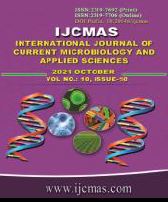


 National Academy of Agricultural Sciences (NAAS)
National Academy of Agricultural Sciences (NAAS)

|
PRINT ISSN : 2319-7692
Online ISSN : 2319-7706 Issues : 12 per year Publisher : Excellent Publishers Email : editorijcmas@gmail.com / submit@ijcmas.com Editor-in-chief: Dr.M.Prakash Index Copernicus ICV 2018: 95.39 NAAS RATING 2020: 5.38 |
Cryptosporidiosis is a zoonosis disease which classified as waterborne disease caused by Cryptosporidium sp. and can inflict acute to chronic diarrhea through small intestine infection. The basic in diagnosing cryptosporodiosis is microscopic or moleculer inspection of feces samples. The objective of this study was to find out the Cryptosporidium sp. infection in HIV/AIDS patients with cluster of differentiation 4 (CD4) ≤ 350 sel/mm3 in m djamil padang. This study was observational descriptive research by using feces, questionnaires, and medical record. This research samples were part of the population which fulfill in the inclusion and exclusion criteria in VCT Policlinic of m djamil padang. Two from forty respondences of this study was found positive of Cryptosporidium sp. Oocyst in their feces. The frequencies based on gender could not be determined because the different number of men and women respondences. From the anamnesis by using questionnaires, this two respondences with positive result did not have diarrhea (asymptomatic). Based on data on drinking water sources and daily water sources as a risk for Cryptosporidium sp infection, there were no significant numbers. From the same typed of water sources, more was found to be negative oocyst than positive oocyst. Based on the source of their drinking water, one of the used cooked water and the other one used retail refill water. Based on their daily water resources, both of them using Water Supply Company (PDAM). It could be influenced by the location, environmental factors, and activities of each of them those were different.
 |
 |
 |
 |
 |